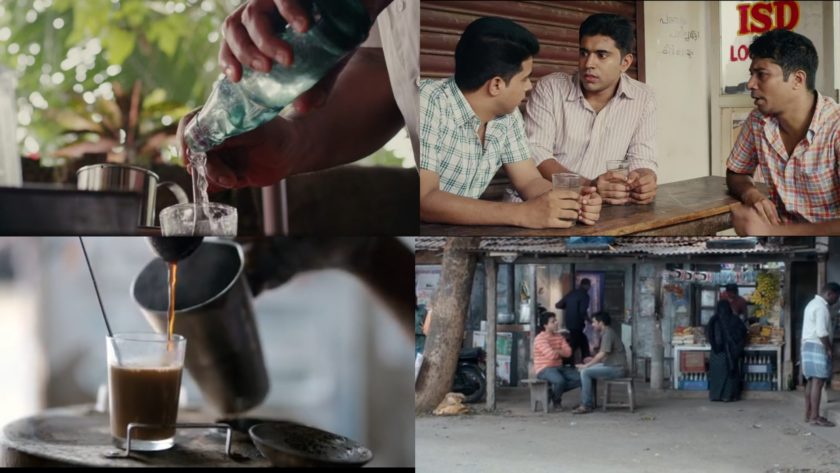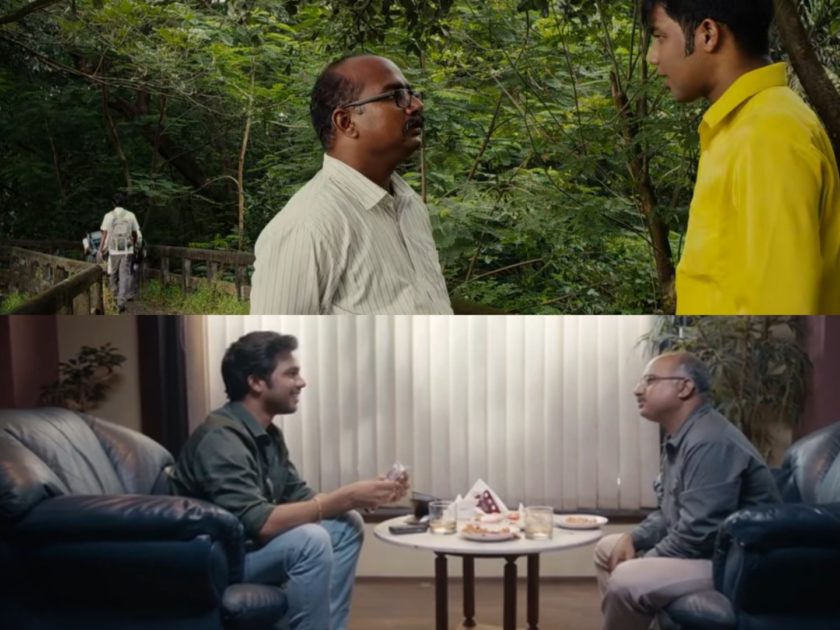Mohsin Kassim’s Thobama, which was released 2 years ago, premiered on Asianet recently. The film, following a trajectory of modern day films such as Indian Rupee, ABCD and (obviously) Premam, incidentally released in the same year of Venu’s Carbon. These films have common central narratives of wishy-washy youth’s reckless ambition at an overnight rags-to-riches story. However Thobama, coming from the associate director of Alphonse Puthren (the film is co-produced by Puthren), also has blatant influences of Premam.
Character dynamics, social backgrounds: Anti-thesis to Premam
The obvious cue taken from Premam is the inter-religious friendship trio of protagonists, instead of George, Koya and Shambu here it’s Balu, Manaf and Thommi played respectively by the Premam stars Siju Wilson, Krishna Shankar and Sharafudheen. An outsider character is played by Shabareesh Varma (another Premam figure).
The nods are however everywhere. Siju Wilson is a former cricket player, the film doesn’t forget the information; through the course there are glimpses that show Balu relentlessly frolicking with a tennis ball. He is kind of a replacement for George here, as the angry young man―but rather ‘sensible’ and straightforward. He gets the conventional heroic arc, a romance track with the girl-next-door Nithya (Punya Elizabeth) and there’s the quintessence of “harmless” stalking too, but taking a plain cross-road from Premam template. Here the character acknowledges he might be having mere infatuation. But just when the film gets everything about it right, gently skipping the typical friend-zone territory and sensibly moving to dignified friendship, the director misdirects it to romance and the female character becomes a classic case of prop, only contributing a bucket of running time plus music-video and nothing else to the film.
Thobama delicately balances friendship dynamics with shades of reality, exploring class differences, anxieties, and privileges.
Manaf (Krishna Shankar) on the other hand gets an empathetic character completely contrasting to Premam where he had no agency whatsoever between the other two. We don’t get to see Manaf’s house or social background visibly in Thobama just like Premam, but instead there’s a tangible reason here, because Manaf’s character conflict is within himself, his fatigue due to being overweight and inordinate pursuit over an acting career. Manaf is established as an orthodox muslim relying on a fake pundit for whatever he ought to do.
Sharafudheen’s standout performance as Thommi adds depth to the trio’s journey.
But the film’s real protagonist is Thommi (Sharafudheen in his career best performance) who comes from a lower middle-class background. In Carbon, Sharafudheen was an instant moral to his daydreaming friend Sibi (Fahad), Thomas here is an absolute opposite or say, a spiritual doppelganger to Sibi itself. Thommi lives with his Mother in a suburban area, he lost his Father in early ages and that explains his crime-leaning tendencies. There are few scenes in the film which shows Thommi’s dysfunctional relationship with his Mother, without being any cheeky and with all sorts of heartening relatability does this get simulated on-screen. Now look back vide Premam which neglected parental perspectives completely and followed the male fantasies alone.
A refreshing take on friendship that ventures beyond the bachelor party clichés
Thobama is centered around this trio friendship but apart from being just a glorified bachelor party director Mohsin Kassim portrays this with grey shades and rooted ground reality. The glimpses that confers the class-differences, anxieties, insecurities, conservatisms and privileges amid the friendship is exceptional paperwork. But the only point where the dilemma shrinks is when the ‘split’ happens. The narrative is jolted into the crime-territory but it’s not a late development, the foundation is made early―this trend is already seen in films like Mayaanadhi and Maradona. For Balu, it’s made pretty clear early itself that he doesn’t want to hop into the area, so that explains. While coming to Manaf, his late realisation isn’t convincingly communicated and in-between this friendship lull, nothing really happens, nothing really moves nor nothing shooks emotionally.
The Premam formula!?


The parallels with Premam are hard not to miss. Especially among those, the food-trope. At regular intervals of Thobama i.e at moments of casual conversations the writer resorts to a local tea-shop and a street-food store. In Premam similarly Alphonse Puthren had woven three food-locations (the sarbath shop, the college canteen and the cakery) at intervals. In a hilarious instance, Mary’s Father from Premam appears in a significant role. The wit is supportive on how it changes the Premam dynamics, between a quirky flirt and stern Father to Boss client-agent.
Thobama’s hit-and-miss
There are eclectic touches popping up in each couple of minutes, there’s attention gone to minute details and there are pieces of attentive filmmaking in Thobama, but after a charming first half which organizes it’s multiple characters and subplots very neatly―even despite it’s scribbling randomness, the film doesn’t hit every chord to become consummated by the end. But there are entertaining instances even, the fabulous idea of lottery-heist and contradictory encounters. Probably Thobama misses a creators eye where these ideas could be translated into extraordinarily creative set pieces. The Alphonse Puthren touch, so to speak.

CA Student who’s enthusiastic about films.


Be the first to comment on "Thobama (Review)"